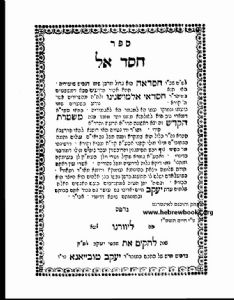A Short Tribute
Hacham Hisdai Almoshlino was born in 1640 in Tetuan, Morocco. He learned Torah from his teacher Hacham Yitzhak Bibas, with whom he served in the rabbinic court, along with Hacham David Hacohen. In 1698, Hacham Yitzhak Bibas died, and in 1708 Hacham David Hacohen died as well, leaving him the sole rabbinic judge for two years. By 1710 he had five of his students join him in the rabbinic court.
Hacham Hisdai Almoshlino was famous for his miraculous abilities, and Jews and Muslims alike would come to receive his blessing.
Both his sons, Shlomo and Yitzhak, died during the same year, between Passover and Shavuot. Another son was born to him and also named Yitzhak - Hacham Yitzhak Almoshlino - who would eventually be appointed Chief Rabbi of Gibraltar.
Hacham Hisdai Almoshlino lived to a ripe old age and passed away on 4 Kislev, 5488 (1728). He authored two books: Mishmeret HaKodesh – explanations on RASHI's commentary on the Torah, published in Livorno in 1825 after his death, and Hessed El – sermons and commentary, published in 1826.
A few quotes from the Rabbi on 'Traditions of the Fathers' in which he teaches that the true honoring of parents is when one lives with them and honors them
" Visit your neighbor sparingly, Lest he have his surfeit of you and loathe you". This means that one honors others more from afar than from nearby. The heart coarsens towards someone who is nearby and becomes a burden and bother, unlike someone distant, for whom the heart yearns and longs, and seeks to bestow kindliness. That is why King Solomon, may he rest in peace, wisely advises to "Visit your neighbor sparingly, Lest he have his surfeit of you and loathe you". When a person, who has always lived with his father and mother, shares his home with them, they are likely to eventually become a burden. This is the meaning of the text, "When a person honors his father and mother, the Holy One, Blessed be He, says: I ascribe credit to them as if I dwelt between them and they honor Me as well" – I know that you will always honor Me, but I do not commend you for this honor, since "From afar God is seen to me". Were I to dwell among you, you might not honor me. If you honor your father and mother, if they dwell among you, "I ascribe credit to them", despite My being distant, "as if I dwelt between them and they honor me as well". This is what is known as true honor. But if you do not honor your father and mother, despite your honoring Me, this is not honor; it is as though I would dwell among you as does your father, and you would not honor Me.
Hessed El, Section 4, sermon, p. 5a. Hacham Yaacov Tubyiana, Livorno, 1826
